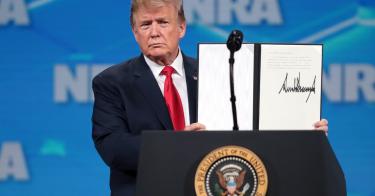President Donald Trump recently announced that he would withdraw the United States from the U.N. Arms Trade Treaty, a move that analysts at The Heritage Foundation have long advocated.
The Arms Trade Treaty is an international agreement that attempts to limit the sale of arms abroad. Its regulation extends all the way from small firearms to battle tanks and warships. It was backed by a coalition of left-wing, non-governmental organizations and gun-control proponents. In 2013, Secretary of State John Kerry signed it on behalf of the Obama administration, but the Senate never ratified the treaty.
The Arms Trade Treaty “has no substantive achievements and is fundamentally unserious, but its effort to promote norms to shape U.S. policymaking poses significant risks to U.S. security,” says Ted Bromund, a research fellow in Heritage’s Margaret Thatcher Center for Freedom.
Bromund published his first report on the Arms Trade Treaty with a former Heritage colleague, Steve Groves, on Aug. 21, 2009, “The U.N.'s Arms Trade Treaty: A Dangerous Multilateral Mistake in the Making.” Since then he has published more than 200 related reports, op-eds, scholarly articles, lectures and blog posts on the subject in addition to appearing in countless media interviews.
Bromund attended the 2012, 2013, 2015, and 2018 Arms Trade Treaty conferences, and addressed the United Nations in 2012 and 2013.
In a report last year, "Why the U.S. Must Unsign the Arms Trade Treaty in 2018,” Bromund wrote that over time the treaty would constrain the United States while having no effect on arms exporters such as China or Russia.
“To the extent that the treaty reduces arms exports from the West, it can only have the perverse effects of driving potential importers to buy from China or Russia—or to develop their own indigenous arms industries that will not fall under the treaty’s purview,” he wrote.
Much of Bromund’s research was reflected in the White House’s statement announcing Trump’s decision. Bromund also met regularly with the State Department and held dozens of House and Senate office briefings.
“Ted has spent years and years on this issue. We were the only think tank making these recommendations,” said James Carafano, vice president of Heritage’s Kathryn and Shelby Cullom Davis Institute for National Security and Foreign Policy and E.W. Richardson fellow. “He has done tremendous and very important work.”
“The president has made the right and responsible decision,” said Heritage President Kay Coles James. “His action defends the Constitution and the sovereignty of the United States and ensures that its arms-export policies remain where they belong: in the hands of the American government and the American people.”
